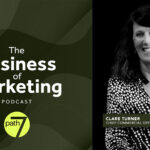By Jean-Marc Papin, SVP Media Technologies and Sustainability, Horizon Media
There is an inherent tension between consumerism and sustainability. From a business perspective, consumerism has historically impelled us to strive for constant growth – as shareholders’ desire for quarterly revenue gains were prioritized above all else. Sustainability asks that we expand the growth focus to include measures to ensure our actions aren’t resulting in irreparable harm to our planet’s resources. This is not an “either-or” proposition. We can have both – a world does exist where we can turn these tensions into intentional solutions for the benefit of all.
As of today, we’re on track to overshoot the earth’s replenishable resources for 2024 by August 1, recognized as Earth Overshoot Day. While unfortunate, this isn’t shocking when we consider that we’re individually incentivized hundreds to thousands of times per day – tiny interactions everywhere we go – to continue to consume. As the adage goes, if we’re not buyin’ we must be dyin’.
As marketers, we have been immensely successful in helping our partner brands and clients reach and often exceed their goals – planning, creating, and placing the billions of digital ads that appear in Google searches and social feeds or on the billboards that we pass daily. Our collective efforts have worked – and really well.
So much so, in fact, that it’s difficult to overstate the power that marketing has had in our culture. Iconic campaigns like the “Think Small” Volkswagen Beetle ads and Apple’s “1984” didn’t just sell products; they reframed social narratives. Marketing has the ability to alter deeply ingrained mindsets and behaviors on a massive scale. It was most succinctly described in the 1927 book Your Money’s Worth: “It’s a magnificent technique. Sanely applied, it could remake the world.” And it has.
If you need proof of its power, just look to the way that governments have had to regulate the industry over the years. In 1970, legislation was passed to severely restrict the ways in which tobacco companies could market their products because of proven human health hazards. Before that, tobacco reigned as a way of life, largely driven by the way companies presented their products in their advertising. Fast forward to recent years when laws have been passed in Amsterdam, the Dutch city of Haarlem, and France to restrict how fossil fuel companies can market their products. This is because fossil fuels are on the same track now that tobacco was 50 years ago – with the main difference being that in our current global economy, it is currently impossible not to rely on fossil fuels for something.
Meanwhile, sustainability has steadily been on the rise (though not at pace with consumerism). What started as a moral side project at many organizations has now become table stakes for doing business for many others, as well as a strategic advantage for the savviest operators. Consumers are demanding products and services that reflect their own value sets, with 96% of US consumers saying they try to live “sustainably” at least some of the time according to BCG. So, how does the marketing and media industry navigate this tension between the constant growth business model and the embrace of sustainability?
We must shift the narrative.
However, it’s naïve to think that consumers will suddenly alter behavior immediately upon hearing or seeing new messages. Instead, it requires consumers to have a recognition of the co-dependency of consumption and the power we all have as individuals to lean into issues that often seem too big to impact.
As such, the consumer perception of value needs to be overhauled from consumption for the sake of consumption to consumption for the sake of sustainability and growth – or, more accurately, sustainable growth. That is the power that we have as an industry. We know that consumption won’t stop, nor do we want it to. But we also know that collectively we can do better. The products and services exist. The values-driven organizations exist. The consumers who want more from their brands and the industries that drive them exist. Companies have a significant opportunity to meet those demands so that we can all move the needle for faster, more meaningful impact across our planet, people, and profits.
Many organizations are working towards this already, but significant opportunity remains for many others to understand the benefits of prioritizing sustainability:
- Moving the needle on climate action is a risk mitigation strategy. It’s increasingly difficult to project accurate revenues or expenses into the future when that future is wholly unpredictable as it pertains to the resources needed to operate and the threats supply chains that we all rely on.
- Customers, especially younger customers, are looking for organizations that they can trust. According to Deloitte, nearly half of Gen Zs (49%) surveyed said ethics played a role in their employment choice. Driving sustainable development, and then making sure that work is broadly shared, increases customer loyalty and, for employees, plays a direct role in hiring and talent retention.
- Sustainability (or as many have termed it in past years, “corporate social responsibility”) sells, outperforming conventionally marketed products across 36 different categories according to a study by NYU Stern’s Center for Sustainable Business.
Admittedly, sustainability transformation is easier posited than executed, especially for long-entrenched brands with diverse product categories and customer sets. But, environmental crises have altered the consumer psyche. Now is the time for a new way of thinking about the products and services we both market and use – and ultimately new actions to create a world where neither growth nor sustainability are sacrificed in pursuit of the other.







